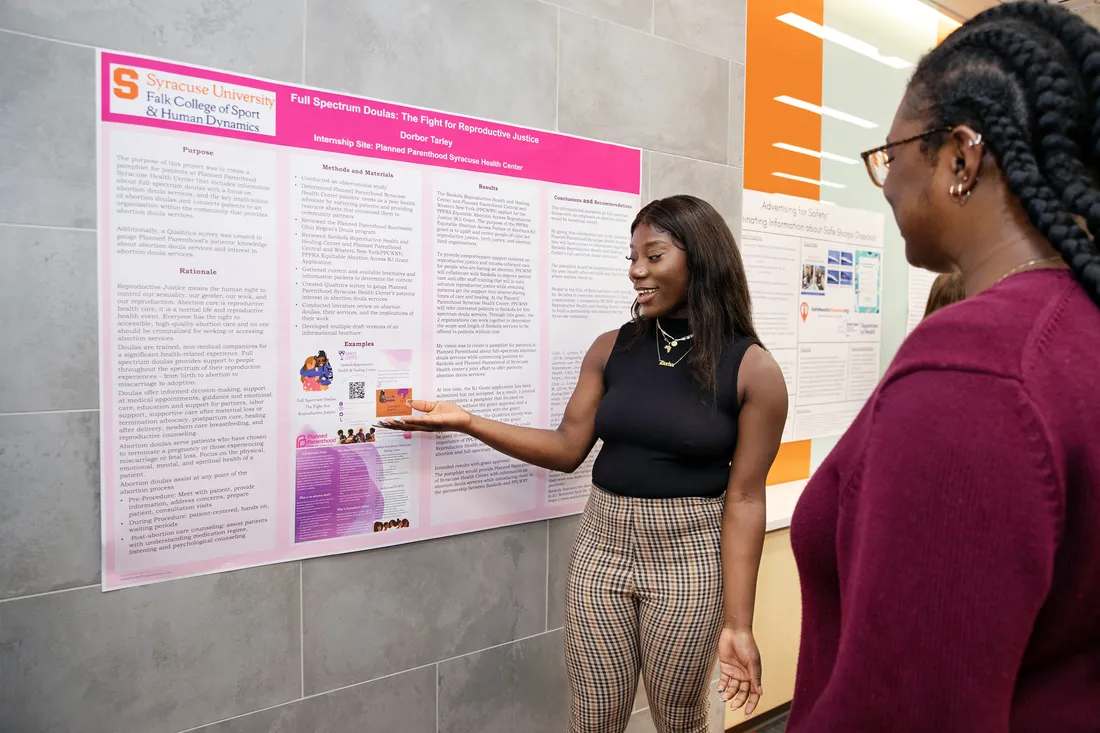
Dorbor Tarley ’22 (left) researched the positive impact of community-oriented health centers on inequity in maternal health.
Throughout her childhood, Dorbor Tarley ’22 served as interpreter when she accompanied her parents to doctor appointments. Her parents had fled war in their home country of Liberia and lived for many years in a refugee camp in Ivory Coast before resettling in Rhode Island when Tarley was four. Helping her parents navigate unfamiliar terminology as they made important medical decisions gave Tarley insight into the American health care system. It also left her with a distinct impression of the way individual health care practitioners’ cultural knowledge and assumptions can shape patients’ experiences of care and the trajectory of their treatments.
I realized that to really address inequities in Black women’s reproductive health care and maternal health, I wanted to be in a position where I could help make systemic change.
Dorbor Tarley ’22
When Tarley made the decision to major in human development and family science at Syracuse University, she began a journey that united her interest in medicine with her determination to address health care disparities affecting historically marginalized populations. Tarley has her sights on medical school, but will first continue her academic journey in a public health master’s program at Johns Hopkins University, starting this fall. Because ultimately, Tarley aims to address inequity in health care at both systemic and individual scale.
Telling Research
While still in high school, Tarley learned that Black women in the United States are three- to four-times more likely to die during childbirth or after delivery than white women. This statistic alarmed her and sharpened her focus—she knew she wanted to work toward reducing this disparity. And, recognizing the broad range of issues underscoring the statistic, Tarley chose the human development and family science program in the David B. Falk College of Sport and Human Dynamics for its interdisciplinary breadth. “It was the right program for me because it offered a premedical track which, in addition to the hard sciences, focused on the life course trajectory of humans and it gave me an opportunity to investigate health through the lens of psychology and sociology,” she says.

Tarley chose her academic track because it offered a premedical track and an opportunity to study health through interdisciplinary lenses.
With the support of the Renée Crown University Honors Program, Tarley was able to dive deeply into original research in her area of interest. Social determinants of health, like socioeconomic class and environment, have been well studied, Tarley says, but—recalling her own family’s experiences with different practitioners—she wondered how implicit bias and racism factored into Black women’s maternal and postnatal health as well. With associate professor of human development Matthew Mulvaney as her Honors thesis advisor, Tarley developed a research project to compare the level of concern generated within a cross section of the general public by women exhibiting the same medical symptoms, with race as the only variable in their story. “The purpose of my research was to discover whether perceptions of women’s distress following childbirth are affected by race and to understand what interpersonal factors might contribute to variations in concern,” she says.
Funding from the Syracuse Office of Undergraduate Research and Creative Engagement (SOURCE) made it possible for Tarley to gather perspectives from 164 representatives of the general population. The results of her research showed survey takers registered more concern for and would more readily recommend medical intervention for white women than Black women showing the same symptoms. This reveals, Tarley explains, how cultural perceptions of Black women are expressed in ways people may not even be aware of but which, with underlying health care practitioners’ decisions, can have very real consequences. “Implicit biases can lead to Black women not being believed or respected. And in health care settings, this manifests in delays in treatment, refusal of services and an overall lack of consideration for Black women’s bodily autonomy,” she says.
Tarley presented her results at multiple conferences and conventions, including representing the University at the ACC Meeting of the Minds Conference in 2021.
The purpose of my research was to discover whether perceptions of women’s distress following childbirth are affected by race and to understand what interpersonal factors might contribute to variations in concern.
Dorbor Tarley ’22
Addressing the Bigger Picture
At Syracuse, Tarley discovered her passion for research. She attributes this to the encouragement she received from professors and mentors like Mulvaney. “Professor Mulvaney taught me to ‘look for the gaps,’” she explains. “Questioning your sources and looking for what’s not yet in the data can reveal where there’s the opportunity and need for more investigation.”

Tarley says that the courses she took with her advisor, Professor Colleen Cameron, helped hone her interests and move toward graduate study in public health.
Tarley brings this perspective to her work as student research mentor with SOURCE. The role was attractive to her in part because she enjoys demystifying the process of research for her peers. “I’m always telling my friends about ways to transform their ideas into research,” she says with a laugh. “Syracuse is a really big research school, and I love being able to say to people, ‘You seem really interested in this topic, and you can study it further—here’s how to start!’” Working with fellow student researchers feeds her curiosity too, she says. “I love working with people from all different disciplines at SOURCE. Everyone’s research is so interesting—I love talking through every part of the creative process.”
Individual Action Matters
Tarley sees the growth of community-centered health care as an important area of positive change for Black women’s maternal health. “Black women in the reproductive health rights and justice movement are developing health care centers rooted in feminist thought around concepts of reproductive justice,” she says. "And the way control, regulation and stigmatization of female fertility has impacted Black women disproportionately.”
I love working with people from all different disciplines at SOURCE. Everyone’s research is so interesting—I love talking through every part of the creative process.
Dorbor Tarley ’22
Tarley’s academic journey at Syracuse led to a recalibration of her path—to now include the pursuit of education in public health and medical school—and Tarley is passionate about where she is headed. “I realized that to really address inequities in Black women’s reproductive health care and maternal health, I wanted to be in a position where I could help make systemic change,” she says. “As a practitioner, one can have a huge impact directly on individual women and families, but to really help my future patients who are dealing with inequities, I’m going to need to have a voice impacting public health policy, as well.”
Tarley draws motivation from her conviction that individual effort can lead to big social change. “I’ve seen how community organizing and activism work,” she says. “I know that if you fight for something, and put in the right resources, and are persistent enough—you can make important changes happen.”


